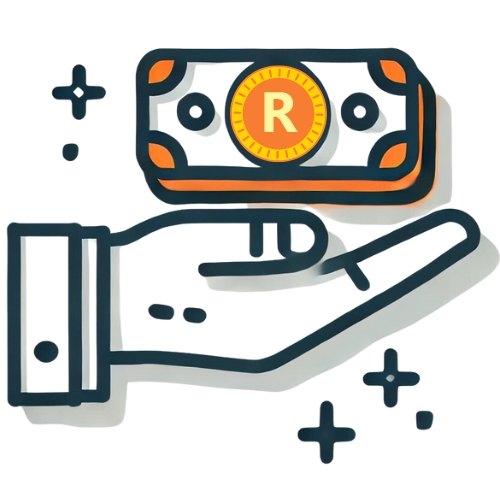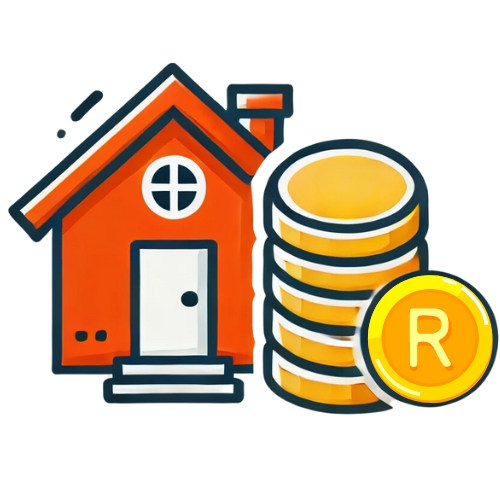
When considering a loan in South Africa, comparing offers is essential to finding the best deal that suits your budget and financial needs. This process involves more than just looking at interest rates; it is also important to evaluate loan terms, fees, hidden costs, and other conditions to avoid unnecessary expenses. Whether you are seeking a personal loan, home loan, or vehicle loan, taking the time to compare options ensures you make an informed decision.
Key Takeaways
- Look Beyond Interest Rates: When comparing loan offers, consider not only the interest rates but also the loan terms, fees, and hidden costs that can significantly impact the total cost of your loan.
- Understanding Loan Types Matters: Different loans, such as personal loans, home loans, and vehicle finance, come with unique features and requirements. It is essential to choose a loan that fits your specific financial situation.
- Choosing the Right Loan Provider: Traditional banks, online lenders, and peer-to-peer lenders each offer different benefits, such as speed, flexibility, or stability. Evaluate these features based on your needs to make an informed decision.
Different Loan Types
Each loan type comes with its own set of features, terms, and conditions that can affect your decision. Here’s a breakdown of some of the most common loan types.

Personal Loans
A personal loan is one of the most flexible types of loans. Typically unsecured, it means you do not need to provide collateral, such as a house or car, to secure the loan. These loans are often used for a wide range of personal expenses, such as medical bills, home renovations, or consolidating other debts.
However, because these loans are unsecured, they generally come with higher interest rates compared to secured loans. It is also important to check for any fees and penalties, such as those for late payments or early repayment, as these can add to the overall cost.

Home Loans
Home loans, also known as mortgages, are used to finance the purchase of a home or property. These loans typically have much longer repayment terms compared to personal loans, ranging from 20 to 30 years, and are secured by the property itself. This means that if you fail to make payments, the lender can repossess the home.
When comparing home loan offers, it is vital to look at the total repayment amount over the loan term, not just the monthly instalments. Even a small difference in interest rates can accumulate significantly over 20 to 30 years.

Vehicle Finance
If you are looking to buy a car, vehicle finance is a common option in South Africa. Like home loans, vehicle finance is secured against the asset, meaning the car serves as collateral until you have paid off the loan. Vehicle finance can take various forms, such as hire purchase agreements or financial leases.

Business Loans
Business loans are designed for companies or entrepreneurs who need funding for operational expenses, equipment purchases, or expansion. These loans can be either secured, requiring collateral, or unsecured, which typically come with higher interest rates.
Grasp the full picture with a breakdown of what is a loan principal, so you can weigh options confidently and make informed financial decisions.

Comparing Loan Types
| Feature | Personal Loans | Home Loans | Vehicle Finance | Business Loans |
|---|---|---|---|---|
| Collateral Required | No | Yes (property as collateral) | Yes (vehicle as collateral) | Varies (secured or unsecured) |
| Loan Term | 1 to 7 years | 20 to 30 years | 3 to 5 years | Varies (short-term or long-term) |
| Interest Rates | Higher (due to no collateral) | Lower (due to collateral) | Varies (fixed or variable) | Varies (depending on type and security) |
| Usage | Personal expenses (medical, home, debt, etc.) | Purchase of property or home | Purchase of vehicles | Business expansion, cash flow, equipment |
| Repayment Flexibility | Fixed monthly payments | Fixed or variable payments | Fixed payments, may include balloon option | Depends on loan type (term or revolving) |
| Loan Amount | Ranges from low to high amounts (based on creditworthiness) | Higher amounts (based on property value) | Varies depending on the value of the vehicle | Depends on business size and requirements |
| Fees | May include initiation and service fees | Includes bond registration and legal fees | May include balloon payments, service fees | Varies (may include service fees, penalties) |
| Approval Speed | Fast (1 to 2 days) | Longer (weeks to months) | Moderate (within days) | Varies based on type and lender |
| Common Loan Types | Unsecured | Mortgage and bond loans | Hire purchase, financial lease | Term loans, lines of credit, asset-based |
| Eligibility Criteria | Based on income, credit score | Based on income, property value, credit score | Based on credit score, vehicle value | Based on business income, credit score, and collateral availability |
About Arcadia Finance
Get your loan with ease through Arcadia Finance. With zero application fees and access to 19 trusted lenders, each fully compliant with South Africa’s National Credit Regulator, you’re assured a smooth and reliable process tailored to meet your financial needs.

Key Factors to Consider When Comparing Loan Offers
When evaluating loan offers, several key factors must be considered to ensure you are getting the best deal. These factors go beyond the basic interest rate and can significantly impact the total cost of your loan. Here’s a breakdown of the most crucial points to compare.
Interest Rates
One of the first things to examine when comparing loan offers is the interest rate. You may encounter two types of interest rates:
- Fixed Interest Rates: A fixed rate remains the same throughout the loan term, meaning your monthly repayment will not change. This option is ideal if you prefer predictable payments and want to avoid fluctuations in the market.
- Variable Interest Rates: A variable rate can change over time based on market conditions. While variable rates may start lower than fixed rates, there is a risk they could increase, resulting in higher repayments.
You should also compare the Annual Percentage Rate (APR), which reflects the total yearly cost of the loan, including both interest and any fees. The APR provides a more accurate picture of the overall cost, making it easier to compare different loans side by side.
Loan Amounts
The loan amount refers to how much you can borrow, which varies by lender and loan type. Secured loans (such as home loans) often offer higher amounts, while unsecured loans (like personal loans) may have lower limits. Lenders assess your credit and finances differently, so amounts can vary. Choose a loan that meets your needs without over-borrowing, and compare available amounts from different lenders for the best fit.
Loan Term
The loan term is the period over which you will repay the loan. Loan terms can be short (a few months) or long (several years), and they directly affect your monthly payments.
- Shorter Terms: Shorter terms generally mean higher monthly repayments but lower overall interest costs. If you can afford the higher payments, this could save you money in the long run.
- Longer Terms: Longer terms result in smaller monthly payments but increase the total amount of interest you will pay over time. This option may be better if you need to keep your monthly expenses low, but it will cost more in the long run.
Understanding the pros and cons of each option will help you determine which loan term is best suited to your financial situation.
Repayment Flexibility
Repayment flexibility refers to the terms of your repayment schedule and whether the lender offers options that suit your financial situation.
- Payment Schedules: Some lenders allow you to choose between weekly, bi-weekly, or monthly repayments, while others may offer only one option. Selecting a schedule that aligns with your cash flow can make repayment more manageable.
- Early Repayment Options: Many borrowers prefer to pay off their loans early to reduce interest costs. However, some lenders charge penalties for early repayment, which can diminish the benefit of paying off the loan faster. Be sure to check for any fees associated with early settlement before committing to a loan.
Understanding why interest rates fluctuate can empower you to time your loan applications for maximum savings. Factors like economic trends and credit policies impact rates, so stay informed to secure the best possible deal for your financial future.

Fees and Hidden Costs
Beyond interest rates, loans often come with additional fees that can significantly impact the overall cost. Initiation fees are a common one-time charge for setting up your loan account, and these fees can vary between lenders. Since they can add up, it is essential to check them before finalising your loan agreement. Similarly, monthly service fees are charged by lenders to maintain your account and are added on top of your loan instalments. Make sure to factor these into your repayment calculations to ensure affordability.
Penalty fees may apply if you miss a payment, pay late, or decide to settle your loan early. These penalties can vary, so it is vital to review your loan contract carefully to avoid unexpected costs. Additionally, many lenders offer or require loan protection insurance, which covers your repayments in case of unforeseen events like job loss or illness. While this insurance provides peace of mind, it also increases the overall cost of the loan. Compare your options to determine if it is necessary for your situation.
Credit Score and its Impact
Your credit score significantly impacts your eligibility for loans, as well as the interest rates and loan amounts you may be offered. Lenders use this score to assess lending risk; a higher score often means you’re considered lower risk, which can lead to lower interest rates and better loan terms. On the other hand, a lower score may lead to higher rates or even denial of a loan. Maintaining a strong credit score improves your chances of accessing favourable loan terms and borrowing larger amounts when needed.
Improving Your Credit Score Before Applying
If your credit score isn’t where you would like it to be, there are steps you can take to improve it before applying for a loan:
- Pay your bills on time: Timely payments on credit cards, utilities, and other debts will gradually boost your credit score.
- Lower your credit utilisation: Aim to use less than 30% of your available credit limit on revolving credit accounts, such as credit cards.
- Limit new credit inquiries: Each time you apply for credit, it impacts your score. Try to limit applications in the months leading up to your loan application.
Improving your credit score can take time, but it can make a significant difference in the offers you receive from lenders. This means you will have access to lower interest rates and better repayment terms, ultimately saving you money over the life of the loan.
Knowing what lenders look for in a loan application can make all the difference! Discover how your creditworthiness directly impacts your loan options and approval odds.

Comparing Loan Providers
When comparing loan providers in South Africa, it’s helpful to see how traditional banks, online lenders, and peer-to-peer (P2P) lenders stack up against each other. Each has unique features, advantages, and potential drawbacks.
| Feature | Traditional Banks | Online Lenders | Peer-to-Peer Lenders |
|---|---|---|---|
| Trust & Security | Highly regulated, well-established institutions | Regulated but newer players, fewer physical branches | Growing market, not always fully regulated |
| Approval Time | Slower, can take several days to weeks | Fast, often within 24-48 hours | Moderate, typically a few days |
| Qualification Requirements | Stricter, usually requires a good credit score and stable income | More flexible, easier approval for lower credit scores | Flexible, but depends on investor preferences |
| Interest Rates | Can be competitive, but may be higher for riskier borrowers | Often higher due to ease of access and faster approval | Potentially lower, depending on the investor |
| Customer Service | In-person support available at branches | Primarily online or phone-based support | Online platform-based support, typically impersonal |
| Fees & Hidden Costs | May include initiation and service fees | Some hidden fees, but usually transparent upfront | Higher fees, especially for missed payments |
| Loan Variety | Wide range of loan products (personal, home, business) | Usually limited to personal loans and vehicle finance | Typically personal loans with flexible terms |
| Flexibility | Less flexible with repayment terms and early payments | More flexible, often with early repayment options | Generally flexible, depends on investor preferences |
Conclusion
Comparing loan offers is a crucial step to ensure you choose the best option for your financial situation. By thoroughly evaluating interest rates, loan terms, fees, and repayment flexibility, you can avoid unnecessary costs and make a more informed decision. Whether you opt for a traditional bank, an online lender, or a peer-to-peer lender, understanding the differences between these providers will help you find the most suitable loan.
Taking the time to review all aspects of the loan ensures that you not only meet your current financial needs but also maintain long-term financial stability.
Frequently Asked Questions
When comparing loan offers, focus on key factors such as interest rates, loan terms, fees, and hidden costs. Additionally, review the loan amount offered, repayment flexibility, and any penalties for early repayment or missed payments. These elements can significantly affect the total cost of the loan.
With a fixed interest rate, your monthly payments remain unchanged throughout the loan term, offering steady and predictable costs. In contrast, a variable interest rate may shift with market trends, which means your payments could increase or decrease over time. Fixed rates provide stability, while variable rates may lead to savings if market rates decline.
The Annual Percentage Rate (APR) represents the total yearly cost of a loan, including both the interest rate and any associated fees. It offers a better reflection of the true cost of the loan than the interest rate alone, making it easier to compare offers side by side.
Not necessarily. While a low interest rate is appealing, it is essential to consider other factors such as fees, loan terms, and repayment conditions. A loan with a lower interest rate but high fees or longer terms might ultimately cost more in the long run.
Your credit score plays a significant role in the types of loans you qualify for and the interest rates you’re offered. A higher credit score typically results in lower interest rates and better loan terms, while a lower score may lead to higher rates or even loan denial. Improving your credit score before applying can help you secure better offers.



